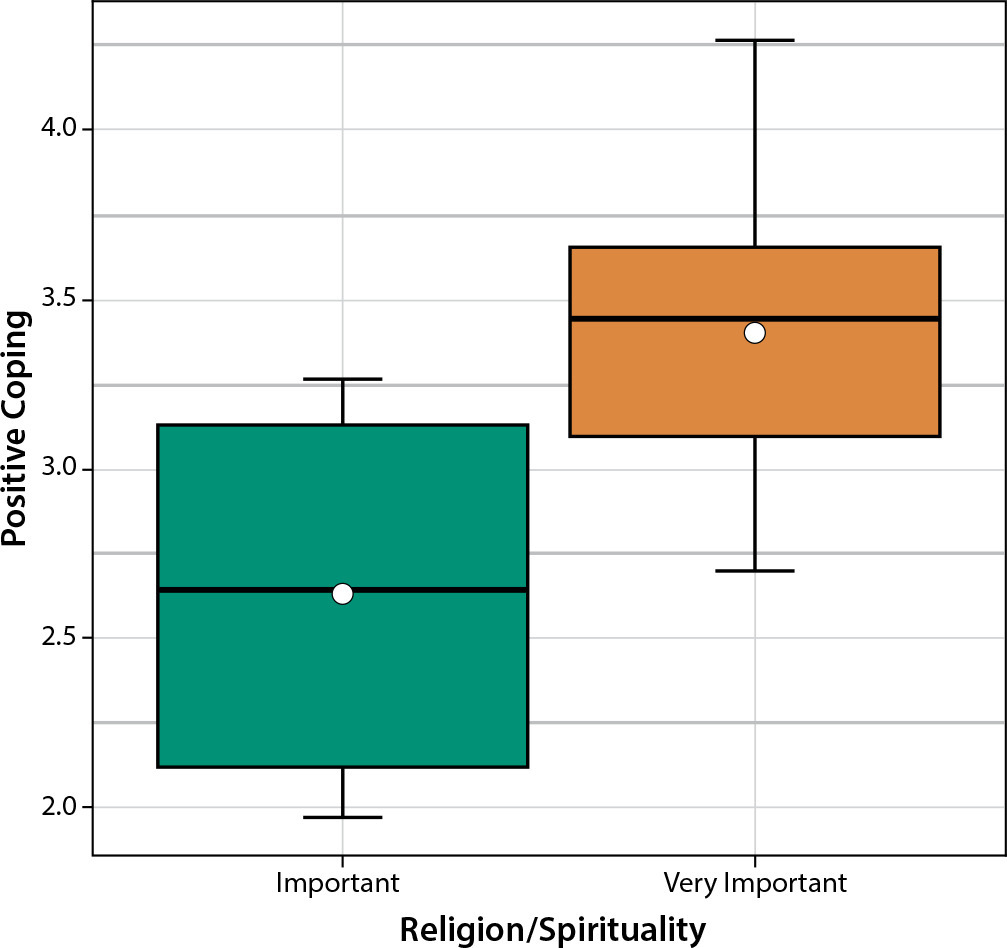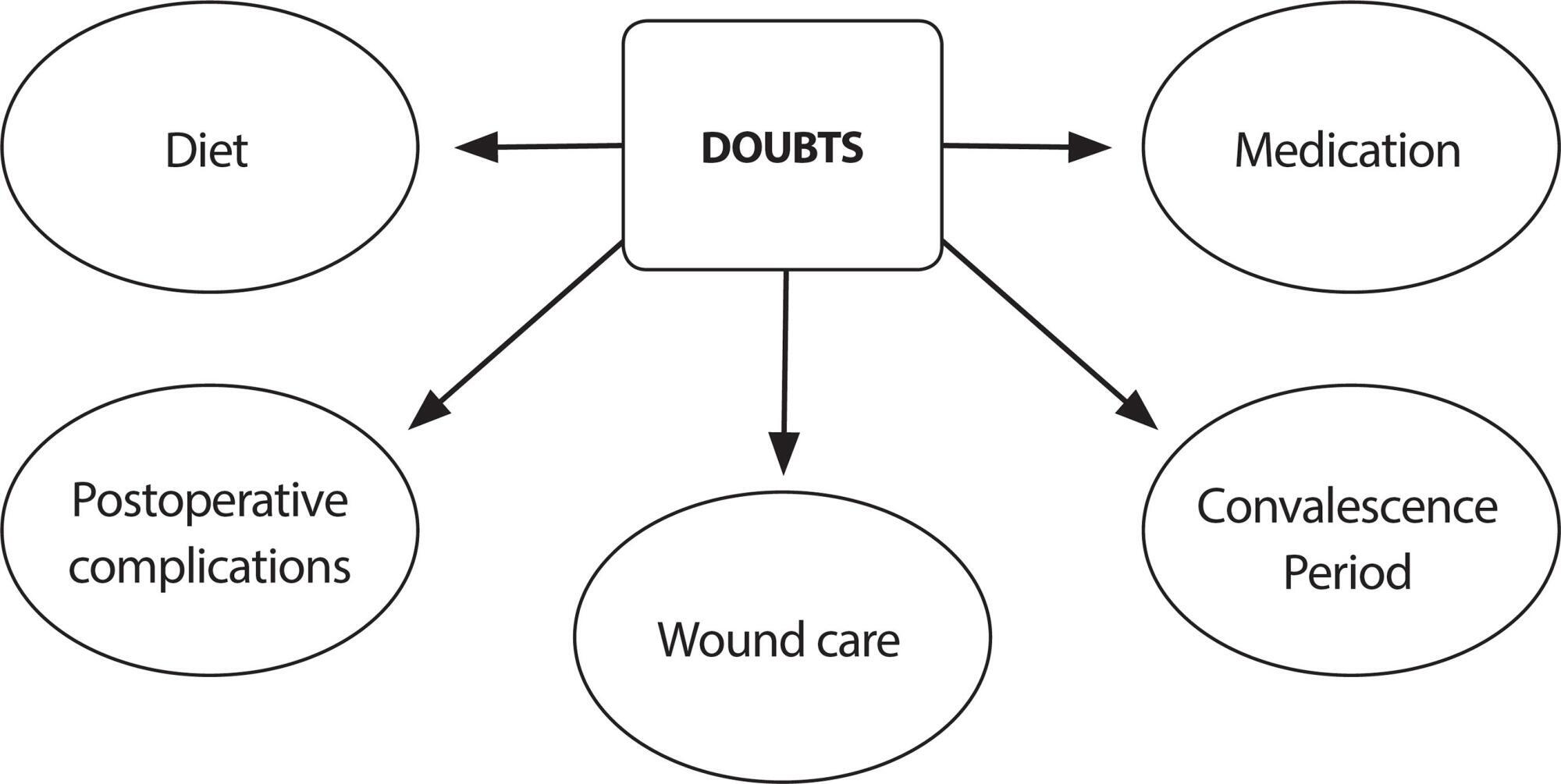-
ORIGINAL ARTICLE
Religious/spiritual coping in informal caregivers of children with cleft lip and/or dysphagic palate
Revista Brasileira de Enfermagem. 2022;75(Suppl 2):e20201300
11-10-2022
Resumo
ORIGINAL ARTICLEReligious/spiritual coping in informal caregivers of children with cleft lip and/or dysphagic palate
Revista Brasileira de Enfermagem. 2022;75(Suppl 2):e20201300
11-10-2022DOI 10.1590/0034-7167-2020-1300
Visualizações0Ver maisABSTRACT
Objectives:
to identify the use of religious/spiritual coping in informal caregivers of children with cleft lip and/or palate, dysphagic, powered exclusively by probe.
Methods:
descriptive and cross-sectional study, including 30 informal caregivers. For data collection, a Sociodemographic Questionnaire and the Brief Religious/Spiritual Coping Scale were used. For statistical analysis, ANOVA, Student’s t and Spearman’s correlation tests were used, with a significance level of 5%.
Results:
the use of religious/spiritual coping was high among participants (mean=3.71), with a predominance of positive (mean=3.30) compared to negative (mean=1.88). It was evident that the greater the reported importance of religiosity/spirituality in the participants’ lives, the greater the positive coping (p=0.001).
Conclusions:
informal caregivers used positive religious/spiritual coping as a way of coping with care demands related to the child’s health condition. These findings point to the importance of including spirituality/religiosity as health indicators.

-
ORIGINAL ARTICLE
Orthognathic surgery: doubts from patients with orofacial fissures regarding the immediate postoperative period
Revista Brasileira de Enfermagem. 2021;74(2):e20200089
05-21-2021
Resumo
ORIGINAL ARTICLEOrthognathic surgery: doubts from patients with orofacial fissures regarding the immediate postoperative period
Revista Brasileira de Enfermagem. 2021;74(2):e20200089
05-21-2021DOI 10.1590/0034-7167-2020-0089
Visualizações0Ver maisABSTRACT
Objectives:
to identify the main doubts regarding the immediate postoperative care of patients with orofacial clefts undergoing orthognathic surgery.
Methods:
cross-sectional, quantitative study, developed in a public and tertiary hospital, between November 2017 and May 2018. Data collection occurred through interviews during the preoperative nursing consultation. An instrument was used to describe doubts, which later were grouped according to the subject.
Results:
48 patients participated. The doubts referred to sun exposure (56%), food/mastication (48%), the relationship between intermaxillary block-breathing-vomiting (48%), oral hygiene (31%), physical activity restriction (27%), nasopharyngeal cannula, removal of surgical stitches, hospitalization time and speech/communication (23%), bleeding, cryotherapy, facial massage, aesthetic and functional results, healing, edema/ecchymosis, postoperative pain, and changes in facial sensitivity (21%).
Conclusions:
the doubts were related to food, the period of convalescence, care for the surgical wound, postoperative complications, and medications.
-
ORIGINAL ARTICLE
Patients and informal caregivers’ questions about alveolar bone graft post-operative care
Revista Brasileira de Enfermagem. 2020;73(5):e20190403
07-08-2020
Resumo
ORIGINAL ARTICLEPatients and informal caregivers’ questions about alveolar bone graft post-operative care
Revista Brasileira de Enfermagem. 2020;73(5):e20190403
07-08-2020DOI 10.1590/0034-7167-2019-0403
Visualizações0Ver maisABSTRACT
Objectives:
to identify patients’ and informal caregivers’ questions related to alveolar bone graft post-operative care.
Methods:
analytical and cross-sectional study, developed in a public and tertiary hospital between October 2017 and February 2018. The sample consisted of 46 participants. Data collection occurred during the preoperative nursing consultation through interview. The doubts were described in a form prepared by the researchers and later grouped by similarity of the subject.
Results:
doubts referred to diet (type of food, consistency, temperature and time period), surgical wound care (oral hygiene, graft rejection, removal of surgical points), post-operative complications (bleeding and edema), convalescence period (sun exposure, physical effort, time away from activities, length of stay) and medications.
Conclusions:
identifying the doubts allowed planning and implementing nursing care focused on the real needs of the clientele, favoring the rehabilitation process.

-
ORIGINAL ARTICLE
Parental care for infants with feeding tube: psychosocial repercussions
Revista Brasileira de Enfermagem. 2020;73(2):e20180360
03-30-2020
Resumo
ORIGINAL ARTICLEParental care for infants with feeding tube: psychosocial repercussions
Revista Brasileira de Enfermagem. 2020;73(2):e20180360
03-30-2020DOI 10.1590/0034-7167-2018-0360
Visualizações0Ver maisABSTRACT
Objectives:
to understand the psychosocial repercussions experienced by caregiving parents, resulting from care for the child with dysphagic cleft lip and palate.
Methods:
qualitative study, developed in a tertiary hospital in September 2016. The sample defined by theoretical saturation consisted of seven mothers. Data collection was performed by unstructured interview, being audio-recorded and fully transcribed. Symbolic Interactionism was used as theoretical framework, and Thematic Content Analysis as methodological framework.
Results:
the following themes emerged: diagnosisimpact and coping; coping with overload and stress; interaction between caregivers as an acceptance and coping strategy; impact on family and social life of caregivers; and curiosity coping, and family and community prejudice.
Final considerations:
despite the physical and emotional overload, the mother figure plays the main and determining role in care, reflecting the complexity of care.



